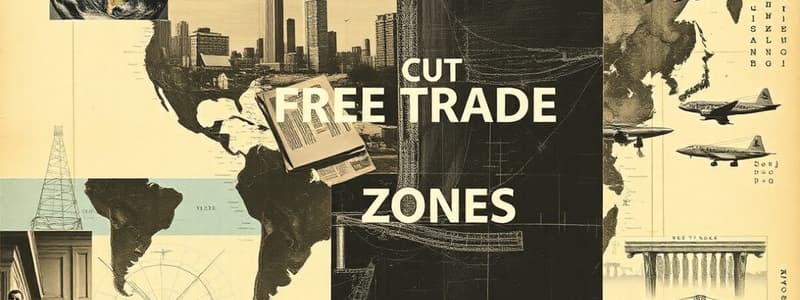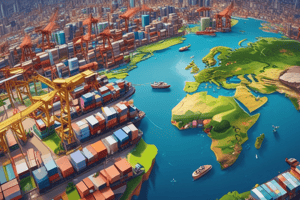Podcast
Questions and Answers
What is a primary characteristic of Free Trade Zones (FTZs)?
What is a primary characteristic of Free Trade Zones (FTZs)?
- They operate under the same regulations as the rest of the host nation.
- They are typically found only in developed countries.
- They provide tax and regulatory advantages for trade-related activities. (correct)
- They prohibit any manufacturing or reconfiguration of goods.
Which of the following is NOT a feature associated with Free Trade Zones?
Which of the following is NOT a feature associated with Free Trade Zones?
- Regular inspections by local customs authorities. (correct)
- Minimal intervention by local law enforcement.
- Established near major seaports or international airports.
- Reduced Anti-Money Laundering (AML) controls.
Which factor contributes to the laundering risks in Free Trade Zones?
Which factor contributes to the laundering risks in Free Trade Zones?
- Weak security measures that allow easy repackaging of illegal cargo. (correct)
- Established barriers to prevent smuggling.
- Robust inspection procedures for shipments.
- Stringent communication between FTZ authorities and law enforcement.
What role do Free Trade Zones play in international trade?
What role do Free Trade Zones play in international trade?
Which of the following is a challenge unique to Free Trade Zones?
Which of the following is a challenge unique to Free Trade Zones?
How many Free Trade Zones are there globally?
How many Free Trade Zones are there globally?
Where are Free Trade Zones predominantly located?
Where are Free Trade Zones predominantly located?
What can be a result of the relaxed oversight in Free Trade Zones?
What can be a result of the relaxed oversight in Free Trade Zones?
Which of the following Free Trade Zones is located in South Korea?
Which of the following Free Trade Zones is located in South Korea?
What is a common activity performed on goods within a Free Trade Zone?
What is a common activity performed on goods within a Free Trade Zone?
Flashcards are hidden until you start studying
Study Notes
Free Trade Zone (FTZ) Overview
- FTZs are designated areas where taxes and restrictions on business, employment, imports, and trade are relaxed.
- They are crucial for international trade, providing unique regulatory and tax advantages for specific trade-related goods and services.
- Predominantly located in developing nations, FTZs are often situated near ports or airports to facilitate trade.
- Over 3,000 FTZs exist across 135 countries worldwide, linking global trade hubs to international financial markets.
Key FTZ Locations
- U.S. Foreign-Trade Zone No. 26 in Atlanta, Georgia
- Daegu-Gyeongbuk Free Economic Zone in South Korea
- Shannon Free Zone in Ireland
- Panama Pacifico Special Economic Zone in Panama
- Dubai Airport Free Zone in the UAE
Operations within FTZs
- Goods in FTZs undergo handling, storage, manufacturing, or reconfiguration before being re-exported.
- Minimal intervention from local customs authorities often characterizes these processes.
- FTZs serve as entry points for goods into the country, increasing efficiency in trade.
Anti-Money Laundering (AML) Risks
- FTZs exhibit reduced AML controls compared to other areas of the host country.
- Communication between FTZ authorities and local law enforcement is often diminished.
- Weak procedures for inspecting goods and entities lead to poor recordkeeping and ineffective IT systems.
- Sales and shipping invoices may not be rigorously examined, complicating shipment legitimacy.
- Urban location and weak security measures allow for easier smuggling and illegal cargo manipulation.
Challenges in Monitoring
- Relaxed oversight in FTZs creates an environment conducive to trade-based money laundering operations.
- FATF notes some FTZs can be as large as cities, complicating cargo monitoring and inspections.
- Zones exporting billions annually may lack competent authorities for adequate oversight of cargo and trade transactions.
Studying That Suits You
Use AI to generate personalized quizzes and flashcards to suit your learning preferences.




